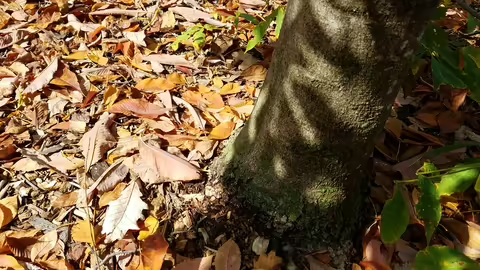URBANA, Ill. – Every fall, an onslaught of leaves drop relentlessly into yards leaving homeowners to rake, bag, and haul them out on the curb. But what many don’t know is that those golden-hued leaves are gold in the garden.
“After raking leaves this fall, think about recycling them on your property rather than bagging them for curbside pick-up,” says Nancy Kreith, University of Illinois Extension horticulture educator.
Fallen leaves are one of the most readily available forms of organic matter for home gardeners. Decomposing leaves increase organic matter in the soil, can be used as mulch for garden beds and lawns, and are a valuable addition to compost piles.
Break down leaves with a leaf shredder or mulcher. Or, run over raked leaves with a lawnmower to cut them into smaller pieces. This initial breakdown allows for improved air circulation and more surface area leading to quicker decomposition.
“Be sure to separate diseased leaves from the leaves you plan to recycle or compost,” says Kreith.
The rate of decomposition for leaves will depend on the leaf size, tree species and moisture level. Brown leaves break down faster if they are shredded and moistened. If un-shredded leaves are applied as mulch, they tend to mat together and suffocate the soil or vegetation.
“However, having matted leaves in a vegetable or annual garden bed in the fall will help smother winter annual weeds,” Kreith says. “In the spring, the leaves can be incorporated or tilled into the soil.”
Another easy way to recycle leaves is by storing them in garbage bags with small holes that allow leaves to break down naturally. Wetting the leaves and having holes in direct contact with the earth, where more microbes are present, will speed up the decomposition process. The end result is referred to as leaf mold or partially decomposed leaves.
“Leaf mold can then be used as mulch or saved as a carbon source for adding to your compost pile in the summer when there is less readily available ‘brown’ materials,” Kreith says.
Brown or dry materials are typically high in carbon and will help to balance the “green” or wet nitrogen-rich materials in a compost pile.
Leaves serve as a wonderful soil conditioner and increase organic matter in the soil, which has a variety of benefits. More organic material will increase the amount of microbial activity which includes beneficial bacteria, fungi, and other microorganisms that aid in plant growth. Organic matter also coats finer clay particles in the soil providing more air space and binds sandy soils allowing for better water retention.
Ideal garden soils should test at 5% organic matter. A standard soil test will provide the percentage of organic matter in soil. For information on soil testing kits and labs, contact a University of Illinois Extension office at go.illinois.edu/ExtensionOffice.
“By recycling leaves on your property, not only will you be improving your garden soil, you will also be making an environmentally conscious choice to keep your yard waste on-site rather than having it hauled off as waste,” Kreith says.
To learn more about the basics of composting, visit extension.illinois.edu/global/composting-resources.
SOURCE: Nancy Kreith, Horticulture Educator, Illinois Extension
ABOUT EXTENSION: Illinois Extension, the public outreach and engagement arm of the University of Illinois, translates research-based knowledge into actionable insights and strategies that enable Illinois businesses, families, and community leaders to solve problems, adapt to changes and opportunities, make informed decisions, and carry technical advancements forward into practice.
PHOTO ACCESS: The photo in this article is available to download for media use.
